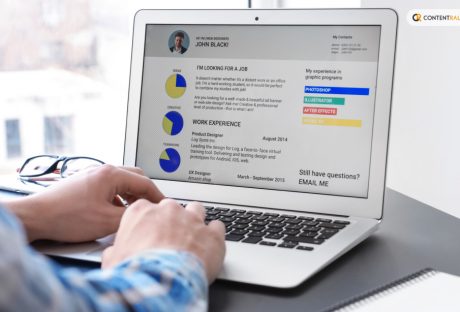Looking for resume tips is far from a waste of time. Even if you are a seasoned professional at job hunting!
Your resume is your first impression in the professional world, and let’s face it, it could make or break your candidacy.
Before you even sit for that interview, the resume will catch their eyes first!
Whether you’re just starting in your career or looking to make a shift, an impressive résumé opens doors.
So, here is how you can turn your resume from good to the absolute best!
Resume Tips 101
So, without further ado, let’s edit that piece of paper together.
1. Nail Your Header

Name, professional title, and contact information.
Link to LinkedIn profile or personal website.
These are the two must-haves of your CV heading. No, you do not have to make it fancy but straightforward. So that everyone knows what you do professionally.
This will automatically help your recruiters link it to their current job position.
Not only does this allow employees to find and connect with you, but it also adds a modern edge to your resume.
2. Write A Powerful Career Summary
This is a short introduction paragraph like a modified objective statement describing your skills and qualifications.
Therefore, make it short but impactful!
Your summary should be about 3-5 sentences, packed with keywords from the job description. But do not make it too long so that it bores your audience.
3. Keep It formatted
Stick to one that will make your resume easy to read: chronological, functional, or hybrid.
Unless you have a unique situation, such as a career change, most recruiters would prefer the chronological format.
It makes it easier to understand!
4. Make It ATS Friendly
This is new, but this is the new corporate, and our resume tips must cater to the same.
Many companies use an Applicant Tracking System (ATS) to scan your resume.
If the ATS can’t read your resume, it won’t make it to human eyes. Could you Keep it clean and straightforward?
5. Tailor Your Resume For Each Job

Tailor your resume to each job you apply for by highlighting the responsibilities and qualifications listed in the job posting.
Try to incorporate the exact words and phrases in the job posting to ensure it’s a close match.
Yes, it could be tedious, but it is important at the end of the day!
Remember, a general resume won’t impress anyone. A tailored resume shows effort, which will make you stand out.
6. Highlight Your Achievements, Not Just Duties
Employers want to know your winning game! Not just what you were responsible for.
Therefore, use bullet points with quantifiable results like, “Increased sales by 20% in six months.”
This is where you show the impact of your work, not just what you did.
7. Use Action Verbs
Begin each bullet point with a strong action verb such as “managed,” “designed,” “created,” or “led.”
One of the best resume tips we would provide is, to stop being like the others. Even when you are using certain verbs.
Therefore, beware of using overused words like:
“Responsible for” or “Assisted with.”
Use strong action verbs on your resume to set them apart and add a more professional, put-together look.
8. Include Your Soft Skills As Well
During your employment with another company, you acquire other hard skills. This is outside that specific role that could be pertinent to the work.
Yes, you should include them as well!
Don’t forget about your soft skills, such as communication, conceptual skills, teamwork, etc.
However, try to avoid bringing them in as achievements.
Show the employer that you have the skills to do the job you are applying for. Plus, it will achieve your new goals with knowledge, but knowing itself is no achievement.
9. Keep It Short
One page is standard for most resumes, especially for students.
If you have ten or more years of work experience– you can consider a two-page resume.
Please Do not overdo it when you do not have much experience to show.
Especially when recruiters are looking for reasons to eliminate candidates, and they will scan them.
10. Add A Professional Title

It works essentially the same as a headline on a newspaper or article – it draws the reader in and makes her want to read more.
Your headline is your tagline. It’s your one shot to make an impression and entice the recruiter to spend more time reading your resume.
This simple step helps clarify your resume’s intent.
11. Present A Robust Work Experience Section
Start with your most recent job.
Use 3-5 bullet points to list your achievements for each role.
But don’t just list your responsibilities. Show how you made a difference as well.
12. Use Numbers Whenever You Can
Numbers can make your resume much more credible than ever. They grab attention and prove your results.
For example, instead of saying, “Improved customer service,” you can say, “Reduced customer complaints by 15%.” Instead of “Grew revenues,” say “Increased revenue by 30%.”
Quantify your work whenever possible. It leaves no room for doubt about the value you bring to the table.
13. Education Matters, But Don’t Overdo It
If you’ve worked for over five years, place your education at the bottom of your resume.
Include your degree, school, and graduation year if you’re still in college or have recently graduated.
Your education section can stay at the top of your resume for new grads. However, if you have some experience, move them to the end.
14. Relevant Certifications
If there are any certifications related to your industry, add them to your resume. Getting certified helps, but do not add the irrelevant ones from the years gone by.
Plus, try to get these certifications from credible sources to add weight to your resume.
List them after your education. Or, if you are out of school for a few years, you can list them in a separate section.
If you took a more relevant course to the job, you’re applying for include it as well!
15. Don’t Get Too Fancy

You do have to make it a graphic design project!
However, keeping a strong format that is visually calming and easy to read is also important.
Use font styles that are easy to read, such as Arial, Times New Roman, or Calibri.
Make sure each section has bold headings so a recruiter can easily navigate your document.
Good design isn’t about flashiness. It’s about making your information easy to read and look professional.
16. No Clichés
Don’t use phrases like “Hard Worker” or “Team Player”! They are boring and cliche, and almost everyone writes the same. So, provide examples that demonstrate those things instead.
Demonstrate these skills with specific real-life examples rather than using stock phrases that lack the power to convey your true worth.
Just like a cliché doesn’t make an impression, the same applies to your resume. It’s all about demonstrating how you are different than others.
17. Tailor Your Resume For The Industry
Let’s be honest: if you’re applying for a design position in a creative company like Wieden Kennedy, your resume shows that better!
Stick to more traditional formats for industries like finance or law.
However, in modern-day digital marketing jobs, ensure that your resume holds that promise.
Know who you are presenting to and design your presentation accordingly.
18. Be Honest About Your Experience
Don’t lie or over-embellish your skills and experience.
Recruiters will quickly pick up on it when they meet you in person for an interview or check your references.
Suppose you have been less than honest; that deletes your credibility. Yes, integrity is everything, and employers need to trust you.
19. Don’t Be Shy About Going Into Detail With Your Career Gaps
One of the common questions we often hear is “How to write s resume when I have a gap year?”
If you have gaps in your employment history, you can say, “I was caring for a sick family member,” or “I took three years off to raise my children.”
However, it was always better to be honest than to embellish your gap years to make yourself sound fancy.
For example, “I was backpacking through Western Europe.” Unless you were actually. You never know when your recruiter might ask you a question.
It’s also productive to include freelance work or volunteer activities during gaps rather than using the gap as a reason for being unproductive.
Employers appreciate honesty. It is not a good idea to over-explain gaps.
20. Link To An Online Portfolio

If you have a portfolio of your work, consider linking to it in your resume. Especially for creative people, writers, or designers.
The portfolio is an example of the skills you can show.
21. Use White Space Effectively
Don’t overdo it with dense blocks of text. Recruiters looking to skim through your resume for the basics will appreciate white space and easy-to-read headings.
Keep margins and line spacing consistent!
White space helps, too!
Literally, it looks ‘cleaner’ and is easier for recruiters to read and process information (according to the eye-tracking model of how people read resumes).
22. Leave Out Irrelevant Job Experience
Any part-time work or job that doesn’t relate to your career should be left out.
You don’t have to include all the jobs you have ever worked at!
Focus on roles that highlight transferable skills or experiences.
23. Work Experience Only (Unless You’re A Recent Grad)
On a resume, you should do so much more than just internships and volunteer work.
Internships and volunteer experience are the best things to have on your resume if you haven’t had real job experience. However, if you’ve been in the workforce for at least one month, stick to work experience.
Highlight what you achieved and your responsibilities in the position, just as you would for a job.
24. Proofread To Perfection
Because even the most qualified candidate can lose out if they make a spelling or grammatical error in their CV. Henceforth, one of our best resume review tips would be to proofread until you are 90% satisfied (because you will never be at 100%, and that is okay).
Use Grammarly or ask someone to read your resume.
No matter what you do, you must have learned that the devil is in the details. Well, it starts with a resume.
25. Skip The Photos, Graphics, Or Fancy Fonts.

These elements can distract or confuse ATS systems. Making it difficult for it to scan for digital recording.
A clean, professional layout is the first step to being considered for the job.
One simple photo is enough. You can look into these interview attire for men and women to help you take a professional CV photo.
26. If You Can Send A Resume, You Can Write A Cover Letter
There is no reason not to send a cover letter with your resume.
In fact, a cover letter can help you make a better impression. Especially if the cover letter is curated to match the job description you are applying for.
It’s your chance to demonstrate enthusiasm and explain why you’re a good fit for the role.
27. Be Careful With The Grammar
Use present tense for current roles and past tense for previous ones
Make sure that the format of your resume remains consistent.
A professional resume should look diligent. Here is how you can do so:
Promote focus while you are learning.
Did you get promoted? Lead bigger teams? Manage larger budgets?
Your resume should be read as a progression of development.
Omit pronouns such as I, me, or my in your resume.
Keep it formal and professional.
This keeps everything sounding clean and polished.
28. Don’t Overdo The Personal Statements
If you put a photo on your CV, it’s likely to be the first thing an employer sees. So, it’s worth spending time perfecting it.
As much as you want to look professional, there’s no point in looking stiff. In fact, you should amend the tone of your photo slightly to match how you present yourself throughout the CV.
Now, coming to your hobbies.
Do not add random hobbies like “taking my dog for a walk.” Yes, even your hobbies should give a subtle hint of your job profile.
Try to add stuff that shows your potential employer how interesting of a person you are outside of this one little job.
29. Don’t Wait Till You’re job Hunting To Update Your Resume
This is one of the biggest mistakes we all make. Only updating the CV before we are about to get
Among all the resume tips, this one is for everyone who is now quite secure in their job.
Go home and update your resume immediately! This should include your new accomplishments, jobs, or talents.
A current resume means you’re always ready for new opportunities!
30. Have References Ready

You don’t need to put references on your resume, but it’s a good idea to have them ready if a potential employer asks.
Ensure you know your references, and they are willing to put in a good word for you.
References are the one thing that can make or break your chances of getting the job. So, choose wisely.
Do Not Get Overwhelmed!
It can be not very safe to face the task of writing your resume, but it’s an essential part of applying for a job. Your resume is your opportunity to make a great first impression on potential employers.
Regardless of how strong the candidate pool might be, this is your chance to let your skills and experience shine through. To win that interview opportunity, you must integrate your skills effectively.
Your resume will evolve over time, but when you’re writing one for each application you submit, use our resume tips to represent yourself best!
Read Also:






















